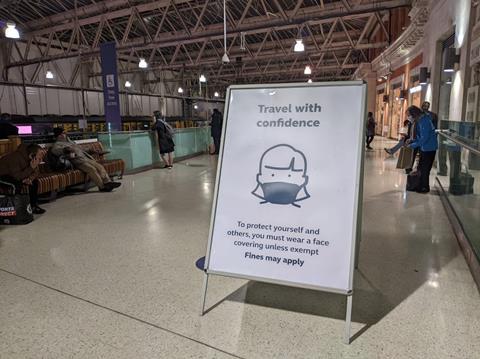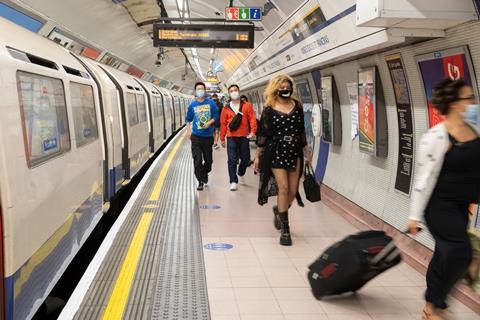
UK: Rail industry organisations have responded to the government’s announcement that coronavirus ‘Plan B’ restrictions in England will be eased from January 27, with the removal of the legal requirement for people to wear a face covering on public transport unless they have a reasonable excuse not to do so.
The Rail Delivery Group said ‘the pandemic has fundamentally changed the way people travel, but taking the train is crucial to a green economic recovery for our towns and cities. So that passengers can travel with confidence we will monitor timetables closely, running services to fit changed travel patterns and ensuring that rail is an attractive choice. This is in addition to carrying out extra cleaning and providing better information about how busy services are.’
Mayor of London Sadiq Khan said face coverings would remain a condition of carriage on Transport for London services.

‘Wearing a face covering is one of the single most important and easiest things we can all do to prevent the spread of Covid-19 and the government should rethink their plans and keep legislation in place to make them mandatory on public transport’, he said.
‘This ensures the rules are clear and consistent and crucially means enforcement action can continue to be carried out on our transport network. Compliance of the rules is far higher with legislation than without.’
General Secretary of the TSSA trade union Manuel Cortes also called for face coverings to remain compulsory, saying ‘we know that face coverings help reduce transmission of the virus and will give the public confidence on public transport.’
ASLEF said ‘we are concerned that this is too much, too soon. A Prime Minister desperate to save his own job is pushing ahead without being able to show the science to back up his plans. We want people back on public transport, of course, but safely.’
Go-Ahead’s Customer & Commercial Director Mark Anderson said ‘whilst work and life patterns have changed for many, in person interaction helps businesses thrive, and commuting can provide valued space between home and the office. Service levels on our buses and trains are increasing as colleague absence reduces, and we look forward to welcoming more customers back.’



